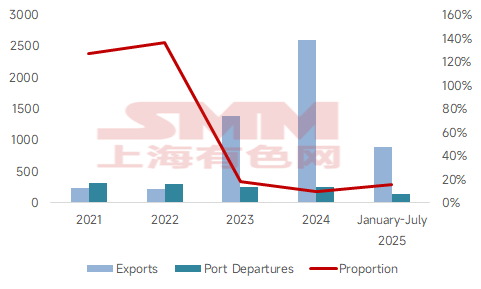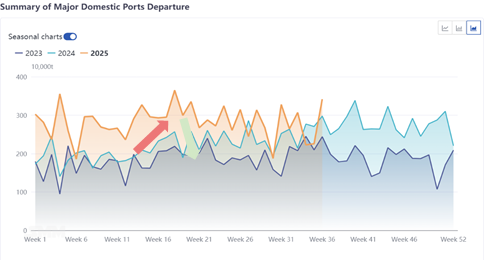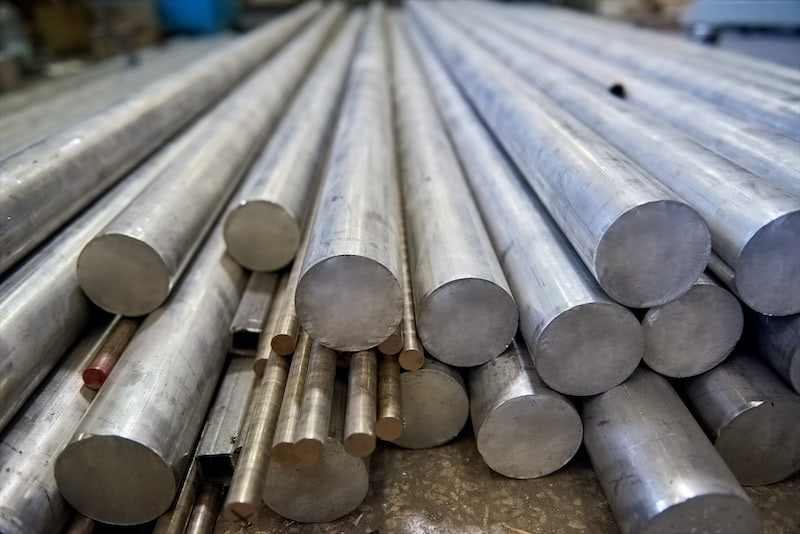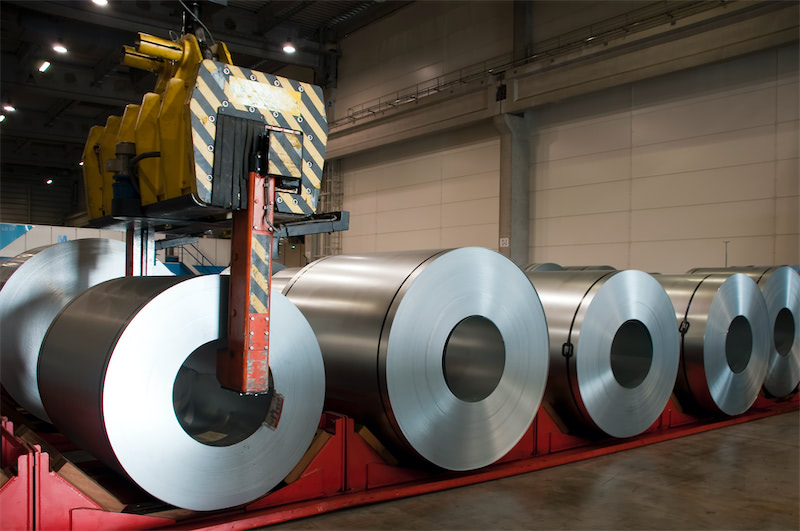- Has the Prevalence of Forging or Purchasing Customs Clearance Documents from Other Import and Export Firms Over Three Years Significantly Contributed to Total Exports?
Forging or purchasing customs clearance documents from other import and export firms refers to an export method where enterprises or individuals without export rights purchase a set of legitimate export declaration documents from import and export companies with operating rights to export goods and declare them to customs.
Its emergence in the steel market can be traced back to 2021, when the state canceled export tax rebates for most steel products, leading the entire steel market to shift from prosperity to decline. Global procurement also partially moved from concentrating in China to countries like India and Southeast Asia. At this time, some individuals took risks by adopting this method, using the 13% national tax loss as a subsidy to illegally and improperly secure overseas orders.
The practice became further prevalent from 2023 to 2024. The market generally believes that about 30% of export volume during this period involved forged or purchased documents. Let’s examine the comparison between port departure data from Guangdong Province, a representative region, and steel export volumes. Starting in 2023, Guangdong’s export volume surged multiples, while port departures remained largely consistent with previous years.
Figure 1: Comparison of Export Volume and Port Departures in Guangdong Province, 2021-July 2025

- II. Low-Price Exports Harm Interests, Leading to Periodic Strict Inspections
Market attention on forged or purchased documents intensified from April 19, 2024, when rumors spread in the steel industry that starting May 1, Chinese customs would closely inspect HRC exports of Q195 and Q235B on a per-shipment basis, significantly impacting such practices. Severe penalties would be imposed for discrepancies in documents. SMM steel port departure data clearly reflected the impact of these rumors. From May 4 to May 10, 2024, total port departures from Chinese ports were 1.8916 million mt, down 26% MoM. A surge in departures occurred between April 19 and May 3, as export traders expedited shipments fearing stricter inspections. However, with no further action from customs, departure data soon returned to normal.
Figure 2: SMM Steel Departures from Domestic Main Ports (32 Ports)

The issue resurfaced on March 28, 2025, when five departments, including the State Taxation Administration, Ministry of Finance, Ministry of Commerce, General Administration of Customs, and State Administration for Market Regulation, jointly issued the "Announcement on Optimizing Services and Standardizing Management for Exports of Goods Subject to Domestic Taxes (No. 8 of 2025)." It stated that taxpayers must complete registration information confirmation with tax authorities via the electronic tax system or service halls before declaring exports of taxable goods to customs. Those who haven’t completed confirmation or have abnormal tax status, such as cancellation, non-compliance, or evasion, must resolve tax issues before proceeding with customs procedures. Article 5 stipulates that taxpayers exporting taxable goods must apply for tax cancellation with tax authorities before seeking deregistration with market regulatory departments, submitting proof of tax clearance. The rules were set to take effect on May 1, but due to incomplete data connectivity between customs and tax systems, the cost of trial error remained low for such practices. Although some customs cities conducted spot checks, the rate was low, and penalties were minimal, allowing large volumes of steel to continue exporting this way. A "rush to export" trend emerged ahead of full data system integration. Meanwhile, tariff disruptions persisted, stimulating exports and re-exports, keeping steel exports high for five months.
Due to space constraints, please refer to the next part for the subsequent content.
*This report is an original work and/or a compiled work of SMM Information & Technology Co., Ltd. (hereinafter referred to as "SMM" {{full name is Shanghai Metals Market}}). SMM holds the copyright in accordance with the law and is protected by laws and regulations such as the Copyright Law of the People's Republic of China and applicable international treaties. Without written permission, no one may reprint, modify, sell, transfer, display, translate, compile, disseminate, or disclose the aforementioned content to a third party or license a third party to use it in any other form. Otherwise, once discovered, SMM will pursue legal liability for infringement, including but not limited to demanding liability for breach of contract, returning unjust enrichment, and compensating for direct and indirect economic losses.
The content contained in this report, including but not limited to information, articles, data, charts, images, sounds, videos, logos, advertisements, trademarks, trade names, domain names, layout designs, and any or all other information, is protected by laws and regulations such as the Copyright Law of the People's Republic of China, the Trademark Law of the People's Republic of China, the Anti-Unfair Competition Law of the People's Republic of China, and applicable international treaties concerning copyright, trademark rights, domain name rights, commercial data information property rights, and other rights. It is owned or held by SMM and its relevant right holders. Without written permission, no institution or individual may reprint, modify, use, sell, transfer, display, translate, compile, disseminate, or disclose the aforementioned content to a third party or license a third party to use it in any other form. Otherwise, once discovered, SMM will pursue legal liability for infringement, including but not limited to demanding liability for breach of contract, returning unjust enrichment, and compensating for direct and indirect economic losses. The viewpoints in this report are based on information collected from the market and the comprehensive assessment of the SMM research team. The information provided in the report is for reference only, and investors should bear their own risks. This report does not constitute direct advice for investment research decisions. Clients should make cautious decisions and should not replace their independent judgment with this report. Any decisions made by clients are unrelated to SMM. In addition, SMM is not responsible for any related losses and liabilities arising from unauthorized and illegal use of the viewpoints in this report. SMM (Shanghai Metals Market) reserves the right to modify and interpret the terms of this statement.
![Before the holiday, the black chain is unlikely to see a trend-driven market [SMM Steel Industry Chain Weekly Report].](https://imgqn.smm.cn/usercenter/zUFfM20251217171748.jpg)

![[SMM Chromium Daily Review] Inquiries and Transactions Weakened, Chromium Market Showed Mediocre Performance Before the Holiday](https://imgqn.smm.cn/usercenter/ENDOs20251217171718.jpg)
